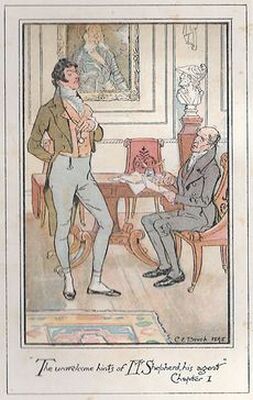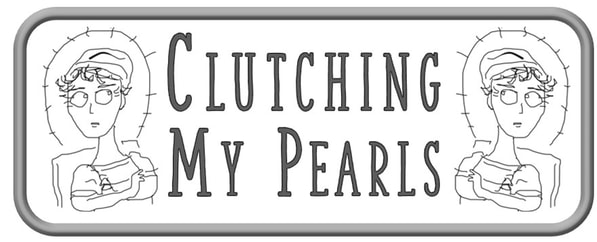
If we were to view Austen’s depiction of Sir Walter in isolation, if we were to look at this caricature independently of the other characters in the book -- and independently of other novels of the period -- we might conclude that Austen is making a larger point about class distinctions in her time. Is she a secret radical?
However, what have we here? What about Mr. Shepherd? Is he portrayed as an educated, self-made man heroically counterpoised against the decadent aristocrat? Not really. The attorney is drawn in subtler terms, but Austen still skewers him. Mr. Shepherd is a flattering, obsequious subordinate: I venture to hint… what I would take leave to suggest is… And I love the quiet touch of: “Mr. Shepherd laughed, as he knew he must, at this wit, and then added—"I presume to observe…”
Sir Walter and Mr. Shepherd are balanced against each other – the former is a snob and the latter is a toady. And what of Mr. Shepherd’s daughter, Mrs. Clay? If Austen has egalitarian impulses, then why does she portray Mrs. Clay as an upstart, a social-climbing gold-digger? And have we forgotten that she throws some serious shade on social climbing ladies who betray themselves through their lack of breeding?
 Imelda Staunton as Mrs. Palmer
Imelda Staunton as Mrs. Palmer They are all ridiculous in their own way; Mrs. Clay with her insinuating flattery, Mr. Shepherd with his unctuous servility, and Sir Walter, with his colossal self-regard. Anne Elliot is surrounded, as author Robert Rodi puts it, by an assortment of "grotesques," and she is the only adult in the room. If Austen finds humor in vulgar people, social climbers, and high-born people, then perhaps she isn't making a radical social point so much as amusing herself and her readers.
I’m even more convinced that Austen was poking fun after reading the novels of some of her contemporaries. 18th-century novels tend to feature an assortment of mockable people–- vain young ladies, selfish, spendthrift aristocrats, social-climbing mamas, and of course, the French. There was nothing subtle about these portrayals. These are stock characters. They are also static characters, a literary term for a character who doesn't grow or change during the course of the novel.
With the lack of subtlety which abounds in 18th century novels, these characters are introduced as though the author was wheeling them onstage with a hand-truck, and announcing what they are: "Look! here's a stupid aristocrat! Here's a ridiculous bluestocking!" And although Austen is a better writer than her peers, some of her characters have the traits of typical stock characters.
Mrs. Palmer in Sense & Sensibility is pretty much introduced by way of explanation. Austen makes it clear to us that she is friendly but silly and not very bright or well educated. She "was strongly endowed by nature with a turn for being uniformly civil and happy, [and] was hardly seated before her admiration of the parlour and every thing in it burst forth…. Mrs. Palmer’s eye was now caught by the drawings which hung round the room. She got up to examine them. 'Oh! dear, how beautiful these are! Well! how delightful! Do but look, mama, how sweet! I declare they are quite charming; I could look at them for ever.'"
“And then sitting down again, she very soon forgot that there were any such things in the room.”
For another example, let’s compare Lucy Barclay from Sarah Burney’s Clarentine with Anne Steele in Sense & Sensibility, Austen's earliest novel. Both women try to be more genteel than they are, and they betray themselves with vulgarity and poor grammar.
Miss Barclay lives with her uncle, Reverend Lenham, and her mother, who acts as his housekeeper. As mentioned in a previous post, Clarentine was terribly nervous about meeting her new housemates when she came to live with Mr. Lenham, but within a few hours of her arrival, she regards them both with contempt, especially the daughter.
We learn that Miss Barclay has a florid complexion and fierce eyes, and: “Her dress, the laborious result of indefatigable pains and trouble, was, at least as far as she knew how to make it so, fashionable even to extravagance; and betrayed such a total want of taste, and an affectation of negligence so evidently studied, that to Clarentine… she appeared more like a monstrous caricature, intended to excite ridicule and surprise, than any other thing she could compare her to.”
On the morning after her arrival in the household, Clarentine is taken aback when Miss Barclay enters her bedchamber before breakfast for a chat, and the author tells us so:
| "Well,' cried that young lady, seating herself as she spoke, and drawing the dressing-glass to the side of the table to reform some error in the set of her cap--- 'how did you sleep? I'm dying for my breakfast -- an't you?" Clarentine, a little surprised at this early debut, smiled and said, "I have scarcely had time to think of it yet; I am but just dressed.'' [Miss Barclay mentions that her uncle is going away soon.] "Then pray," resumed Clarentine, "let us go down, I should wish to see all I can of him before he sets out." "Lord," said Miss Barclay, indolently rising, and still lingering before the glass, "one would think he was your lover, by the anxiety you express over him." "I hope," said Clarentine, moving toward the door, "to find in him a friend -- and that perhaps may be better than a lover." "I am sure," cried Miss Barclay, "I should not think so!" |
| Elinor Dashwood, likewise, is taken aback by Miss Steele: "Miss Steele, who seemed very much disposed for conversation, and... now said rather abruptly, “And how do you like Devonshire, Miss Dashwood? I suppose you were very sorry to leave Sussex.” In some surprise at the familiarity of this question, or at least of the manner in which it was spoken, Elinor replied that she was. “Norland is a prodigious beautiful place, is not it?” added Miss Steele. “We have heard Sir John admire it excessively,” said Lucy, who seemed to think some apology necessary for the freedom of her sister. [Elinor goes all Jane Fairfax-y here:] “I think every one must admire it,” replied Elinor, “who ever saw the place; though it is not to be supposed that any one can estimate its beauties as we do.” “And had you a great many smart beaux there? I suppose you have not so many in this part of the world; for my part, I think they are a vast addition always." Elinor leaves Sir John's house "without any wish of knowing [the Miss Steeles] better." |

“How do you like [my gown]?—Selina's choice—handsome, I think, but I do not know whether it is not over-trimmed; I have the greatest dislike to the idea of being over-trimmed—quite a horror of finery. I must put on a few ornaments now, because it is expected of me. A bride, you know, must appear like a bride, but my natural taste is all for simplicity; a simple style of dress is so infinitely preferable to finery. But I am quite in the minority, I believe; few people seem to value simplicity of dress,—show and finery are every thing. I have some notion of putting such a trimming as this to my white and silver poplin. Do you think it will look well?”
 Introducing Robert Ferrars
Introducing Robert Ferrars In Clarentine, vulgar Lucy Barclay is friends with the designing widow who has designs on the hero, so she is useful to the plot in that respect. Likewise, Mrs. Jennings and her daughter are coincidentally related to the Steele sisters, which brings them into the story. They also play an essential role in taking Elinor and Marianne from Devonshire to London and back again, which facilitates the meetings and separations of the plot. Mrs. Jennings is also a valuable conduit of news in the novel.
Anne Steele's most important interventions in Sense & Sensibility happen offstage. She betrays her sister's secret engagement through her stupidity. Later, she eavesdrops on a crucial conversation. Both Anne Steele and Mrs. Jennings' daughter Lady Middleton are left out of the wonderful Emma Thompson 1995 movie adaptation as unessential to the plot. But we can't imagine Emma without Mrs. Elton.
In the small and confined society of Highbury, Emma will be continually brought into contact with the Eltons, even though they would all gladly never see each other for the rest of their lives. Mr. Elton must perform the marriage ceremony for Emma and Mr. Knightley. Because of their relative social positions, Emma must have the Eltons over for dinner and meet them at other people's houses regularly. Surely Emma pays dearly for her sins! Austen has succeeded so brilliantly in her portrait of Mrs. Elton, that she rouses pity on our behalf for Emma.
I was surprised to discover that the pedantic bluestocking is a stock 18th-century novel character. Female novelists are merciless to the female pedant, and I'll talk about that next time we look at stock characters.
Update: I've written a series of posts about the stock characters of the vulgar Bristol merchant and his family. Mrs. Elton, I contend, is a member of this tribe.
Previous post: Guilt, Misery, and Plot Devices Next post: Mother's Day
| In A Marriage of Attachment, I provided Fanny Price's friend Mrs. Butters with an obnoxious daughter-in-law. Cecilia Butters is ungrateful and always looks on the negative side of things. She pushes Mrs. Butters' buttons, that's for sure! Click here for more about my books. |

 RSS Feed
RSS Feed